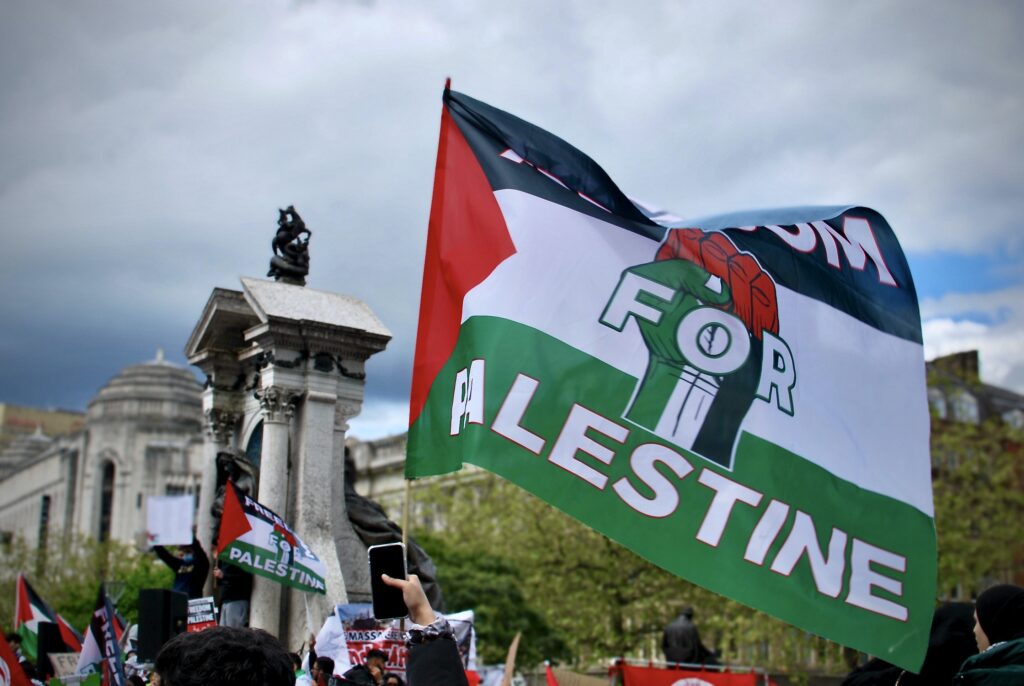Conflict Resolution in Industrial Workshop Teams explores the dynamics of conflict within the context of workplace teams in industrial workshops. This article delves into the various sources of conflict that arise in such teams, ranging from differences in opinion and personality clashes to power struggles and role ambiguity. By analyzing the consequences of unresolved conflict, the article highlights the importance of effective conflict resolution strategies for enhancing team performance and fostering a positive working environment. Drawing upon relevant research and theories, the article provides an overview of these strategies, emphasizing the significance of open communication, active listening, and collaborative problem-solving. Furthermore, it offers practical suggestions for managers and team leaders to implement these strategies and navigate conflicts successfully within their workshop teams.



This image is property of images.unsplash.com.
Understanding the Concept of Conflict
Definition of conflict
Conflict can be defined as a state of disagreement or struggle between two or more parties, which arises due to differences in values, interests, or objectives. In an industrial workshop setting, conflict typically occurs when individuals within a team have opposing viewpoints or conflicting goals, leading to tension and discord.
Types of conflict in an industrial setting
In an industrial workshop, conflicts can manifest in various forms. One common type of conflict is interpersonal, where individuals within the team have personal differences or clashes in personalities. Another type is task-related conflict, which arises from disagreements over work methods, processes, or assignments. Additionally, there can be conflicts over resource allocation, where team members may have conflicting demands or needs for limited resources.
The inevitability of conflict in industrial workshop teams
Conflict is an inherent part of any team dynamic, and industrial workshop teams are no exception. In fact, due to the diverse range of personalities, skills, and perspectives within these teams, conflicts are likely to emerge. It is essential to acknowledge the inevitability of conflict and focus on effectively managing and resolving it rather than trying to avoid conflict altogether. By understanding the causes and impact of conflict, team leaders can implement strategies for conflict prevention and resolution, fostering a more harmonious and productive work environment.
The Impact of Conflict on Industrial Workshop Teams
Effects on team productivity
Conflict within industrial workshop teams can have significant impacts on productivity. When members of a team are engaged in conflicts, their attention and focus may be diverted away from the task at hand. This can lead to decreased efficiency, missed deadlines, and subpar work quality. Moreover, ongoing conflicts may create a negative work atmosphere, causing team members to lose motivation and enthusiasm for their work. Consequently, team productivity may suffer, impeding the overall success of the workshop.
Effects on team relationships
Conflict can strain relationships among team members, leading to deterioration in trust, camaraderie, and collaboration. When interpersonal conflicts arise, it can create hostility and resentment, making it challenging for team members to work together effectively. Team cohesion and synergy can be severely impacted, as individuals may become resistant to sharing ideas or supporting one another. This strain on relationships not only hampers the immediate work environment but can also have long-lasting effects on future teamwork and collaboration.
Long-term repercussions of unresolved conflict
If conflicts within industrial workshop teams are not adequately addressed and resolved, they can have long-term repercussions. Unresolved conflicts often fester and escalate over time, causing damage to team dynamics and morale. This can lead to increased employee turnover, as individuals may opt to leave the organization to escape the negative environment. Furthermore, unresolved conflicts can create a toxic work culture, hindering the recruitment of new talent and undermining the workshop’s overall reputation. Therefore, it is pivotal to address conflicts promptly and implement effective resolution strategies to prevent long-term consequences.
Identifying the Causes of Conflict in Industrial Workshop Teams
Differences in personal interests
Conflicts in industrial workshop teams often arise due to differing personal interests among team members. Each individual may have unique goals, priorities, or preferences that may not align with those of their colleagues. These differing interests can create tensions, especially when resources or opportunities are limited. For example, if two team members have competing aspirations for career advancement, it can lead to a conflictual situation as they both strive to secure the limited available opportunities.
Disagreements over work methods
Another common cause of conflict in industrial workshop teams is disagreements over work methods or processes. Different team members may have varying approaches to problem-solving, decision-making, or executing tasks. When these differences clash, conflicts can arise. For instance, if two team members have conflicting opinions on the most efficient way to complete a project, it can lead to frustration and arguments, hindering the team’s progress.
Clashes over resource allocation
Scarce resources, such as funding, equipment, or manpower, can often be a source of conflict within industrial workshop teams. When there is competition for limited resources, conflicts can emerge as team members advocate for their needs or defend their interests. For example, if the workshop has a limited budget for purchasing new equipment, team members may vie for these resources, resulting in tensions and disputes over fair allocation.
The Role of Communication in Conflict
Importance of clear communication
Clear and effective communication plays a vital role in managing and resolving conflicts within industrial workshop teams. Misunderstandings, misinterpretations, and inadequate communication can exacerbate conflicts and hinder their resolution. It is crucial for team members to express their concerns, needs, and viewpoints clearly and for others to actively listen, understand, and acknowledge these perspectives. Furthermore, open and transparent communication can help prevent conflicts by ensuring that all team members are aware of each other’s expectations, plans, and progress, fostering a more collaborative and cohesive work environment.
Effects of miscommunication on conflict
Inadequate communication or miscommunication can have detrimental effects on conflicts within industrial workshop teams. When information is not effectively conveyed or misunderstood, it can lead to further misunderstandings, resentment, and escalated conflicts. Miscommunication may also perpetuate stereotypes, assumptions, or biases, further fueling tensions within the team. Therefore, it is imperative to prioritize clear and accurate communication to minimize the occurrence and impact of conflicts.
Incorporating effective communication strategies
To mitigate conflicts and promote positive team dynamics, industrial workshop teams should incorporate various effective communication strategies. This includes establishing channels for open dialogue and constructive feedback, encouraging active listening and empathy, and fostering an environment where diverse perspectives are valued and respected. Furthermore, utilizing written communication tools, such as project management software or shared documents, can enhance clarity and minimize miscommunication. Regular team meetings, brainstorming sessions, and team-building activities can also strengthen communication channels and facilitate effective conflict resolution.



This image is property of images.unsplash.com.
Strategies for Conflict Prevention
Establishing clear team roles and responsibilities
One of the key strategies for conflict prevention in industrial workshop teams is establishing clear team roles and responsibilities. When team members have clearly defined roles and understand their individual contributions to the overall objectives, it minimizes the chances of conflicts arising from ambiguity or overlapping responsibilities. Clearly defining job descriptions, project scopes, and decision-making authority can help mitigate conflicts arising from unclear expectations or role conflicts.
Setting realistic work expectations
Setting realistic work expectations is another crucial strategy for conflict prevention. Unrealistic deadlines, workloads, or performance expectations can contribute to conflicts within industrial workshop teams. When team members are under excessive pressure or facing unattainable goals, conflicts may arise due to frustrations, feelings of inadequacy, or blame-shifting. By setting realistic and achievable targets, providing adequate resources and support, and promoting a healthy work-life balance, organizations can reduce the likelihood of conflicts and foster a more positive work environment.
Promoting a positive work culture
A positive work culture is instrumental in conflict prevention within industrial workshop teams. When organizations prioritize collaboration, respect, and open communication, it creates an atmosphere where conflicts are less likely to occur or escalate. Encouraging teamwork, recognizing and celebrating achievements, and promoting a sense of belonging and camaraderie can significantly contribute to conflict prevention. Additionally, fostering a culture of continuous learning and professional development can empower individuals to resolve conflicts constructively and enhance their conflict resolution skills.
Conflict Resolution Techniques
Importance of negotiation and dialogue
Negotiation and dialogue are essential techniques for resolving conflicts within industrial workshop teams. By engaging in open and honest discussions, team members can better understand each other’s perspectives, needs, and concerns. Negotiation allows parties to find mutually agreeable solutions that address the underlying issues causing the conflict. Through dialogue, conflicts can be de-escalated, and compromises can be reached, leading to improved team dynamics and outcomes.
Role of mediation in conflict resolution
Mediation plays a crucial role in conflict resolution within industrial workshop teams. A neutral third party, the mediator, facilitates dialogue and helps parties involved in the conflict identify common ground and potential resolutions. Mediation allows for a structured and unbiased process where all parties are given an opportunity to express their grievances and work towards finding a mutually satisfactory resolution. Mediators can help clarify misunderstandings, manage emotions, and foster communication, contributing to the resolution of conflicts in a fair and balanced manner.
Involvement of third-party arbitration
In complex or protracted conflicts within industrial workshop teams, involving third-party arbitration may be necessary. Arbitration involves the appointment of an external party who acts as a decision-maker and provides a binding resolution to the conflict. This external arbiter carefully considers the evidence and arguments presented by all parties and issues a final decision. While arbitration may be a more formal and legally binding process than mediation, it can provide a definitive resolution to conflicts that cannot be resolved through negotiation or mediation alone.



This image is property of images.unsplash.com.
The Role of Leadership in Conflict Resolution
Leadership duties in managing conflict
Leaders within industrial workshop teams have a critical role in managing and resolving conflicts. It is the responsibility of leaders to create a conducive work environment that promotes constructive dialogue, teamwork, and conflict resolution. Leaders should actively listen to concerns, mediate conflicts, and facilitate productive discussions between team members. They should also provide guidance, support, and resources to help individuals resolve conflicts effectively and prevent future conflicts from arising.
Importance of leader neutrality
Leaders must maintain impartiality and neutrality when resolving conflicts within industrial workshop teams. By remaining neutral, leaders can avoid favoritism or the perception of bias, ensuring that all parties feel heard and their concerns are addressed equally. Additionally, a neutral leader can better facilitate open communication and encourage collaborative problem-solving, leading to more effective conflict resolution outcomes. Demonstrating fairness and even-handedness helps build trust and confidence among team members, enhancing the credibility of the conflict resolution process.
Leadership strategies for conflict de-escalation
Leaders can employ various strategies to de-escalate conflicts within industrial workshop teams. First and foremost, leaders should address conflicts promptly and directly, rather than allowing them to linger and worsen. Active listening, empathy, and understanding are essential to de-escalating conflicts. Leaders should create a safe and non-judgmental space for individuals to express their concerns, and encourage them to find common ground and seek mutually beneficial solutions. Through effective communication, collaboration, and compromise, leaders can guide team members towards conflict resolution and foster a harmonious work environment.
Developing a Conflict Resolution Plan
Steps in formulating a conflict resolution plan
Developing a comprehensive conflict resolution plan is crucial for industrial workshop teams to address conflicts effectively. The following steps can guide the formulation of such a plan:
- Identify and analyze potential conflict triggers within the team.
- Establish a clear process for conflict reporting and escalation.
- Define the roles and responsibilities of team members in the conflict resolution process.
- Implement strategies for open communication and active listening.
- Determine appropriate conflict resolution techniques based on the nature and severity of conflicts.
- Monitor and evaluate the effectiveness of the conflict resolution plan.
- Continually reassess and update the plan based on emerging conflicts and changing team dynamics.
Involvement of team members in the plan
To ensure the efficacy and ownership of the conflict resolution plan, it is crucial to involve team members in its development. By seeking input and feedback from all team members, leaders can gain a more comprehensive understanding of the underlying issues and perspectives. This involvement fosters a sense of shared responsibility and commitment to the plan’s success. Team members can contribute their insights, identify potential gaps or limitations, and help refine the strategies outlined in the plan. By actively engaging team members in the plan, organizations can enhance its relevance and increase its likelihood of success.
Continual reassessment and updating of the plan
A conflict resolution plan in an industrial workshop setting should be viewed as a dynamic document that requires continual reassessment and updating. As team dynamics, goals, and contexts evolve, conflicts may take on new forms or require different approaches for resolution. Regular evaluation of the plan’s effectiveness, feedback from team members, and monitoring of conflict trends can help identify areas for improvement or modification. By continually reassessing and updating the plan, organizations demonstrate their commitment to addressing conflicts proactively and adapting to changing circumstances.
Case Studies of Conflict Resolution in Industrial Workshop Teams
Analyzed situations of past conflicts
Examining case studies of past conflicts in industrial workshop teams can provide valuable insights into the challenges and potential solutions for conflict resolution. These case studies can shed light on the specific factors that led to conflicts, the negative consequences experienced, and the approaches employed to resolve the conflicts successfully. By analyzing real-life scenarios, organizations can identify patterns, common triggers, and effective strategies that can be applied to their own context.
Methods of resolution used
Various methods of resolution can be employed based on the uniqueness of each conflict. In case studies of conflict resolution in industrial workshop teams, different techniques may have been utilized. These techniques can include communication workshops, conflict coaching, peer mediation, or even external consultants to provide guidance and expertise. The methods used to resolve conflicts depend on the nature of the conflict, the preferences of the involved parties, and the desired outcomes.
Lessons learned and improvements made
Case studies of conflict resolution in industrial workshop teams provide an opportunity to reflect on the lessons learned and improvements made through the resolution process. By studying successful resolutions, organizations can gather valuable insights into the specific actions or strategies that led to positive outcomes. These lessons learned can then be applied to future conflicts, improving conflict resolution practices and promoting a healthier work environment. Additionally, case studies can highlight the importance of proactive conflict management and the benefits of investing in conflict resolution training and resources.
Key Takeaways and Recommendations
Recap of conflict resolution techniques
In summary, conflict resolution in industrial workshop teams requires proactive approaches and effective strategies. Key conflict resolution techniques include open communication, active listening, negotiation, mediation, and, if necessary, third-party arbitration. These techniques can help address conflicts promptly, de-escalate tensions, and foster a more collaborative and positive team environment. Additionally, incorporating clear communication strategies, promoting a positive work culture, and establishing realistic work expectations are crucial in preventing conflicts from arising in the first place.
Advice on preventing future conflict
To prevent future conflicts in industrial workshop teams, organizations should focus on cultivating a culture of respect, open communication, and collaboration. This can be achieved by promoting diversity in the team, encouraging active listening, and providing conflict resolution training and resources for team members. Regular team-building activities, feedback sessions, and performance evaluations can also contribute to conflict prevention by addressing any underlying issues before they escalate into conflicts. By investing in conflict prevention strategies, organizations can create a more harmonious work environment with reduced disruptions and increased productivity.
Encouraging consistent team engagement and communication
Consistent team engagement and communication are essential for effective conflict resolution and prevention in industrial workshop teams. Team members should be encouraged to actively participate in team discussions, share their perspectives, and express their concerns openly. By promoting a culture of regular communication and sharing, conflicts can be identified and addressed promptly. Furthermore, team members should be provided with platforms and opportunities to engage in continuous learning and skill development, particularly in areas such as effective communication, problem-solving, and emotional intelligence. Through consistent team engagement and communication, industrial workshop teams can build stronger bonds, resolve conflicts efficiently, and thrive in a collaborative and productive work environment.
